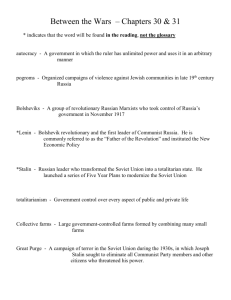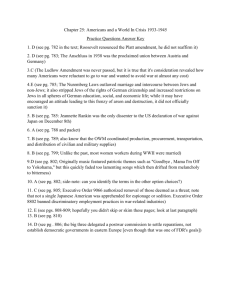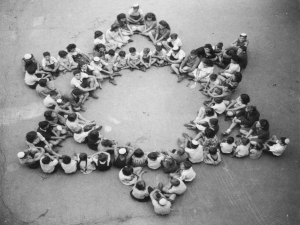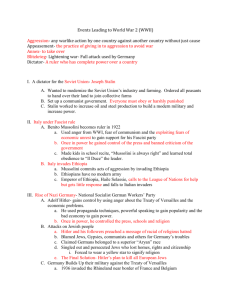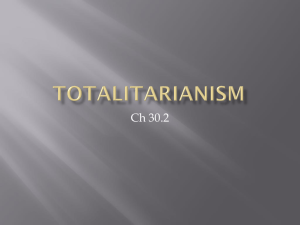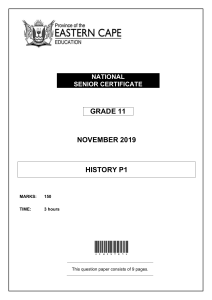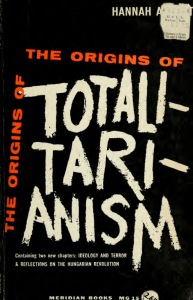4th 9 Weeks Study Guide
advertisement
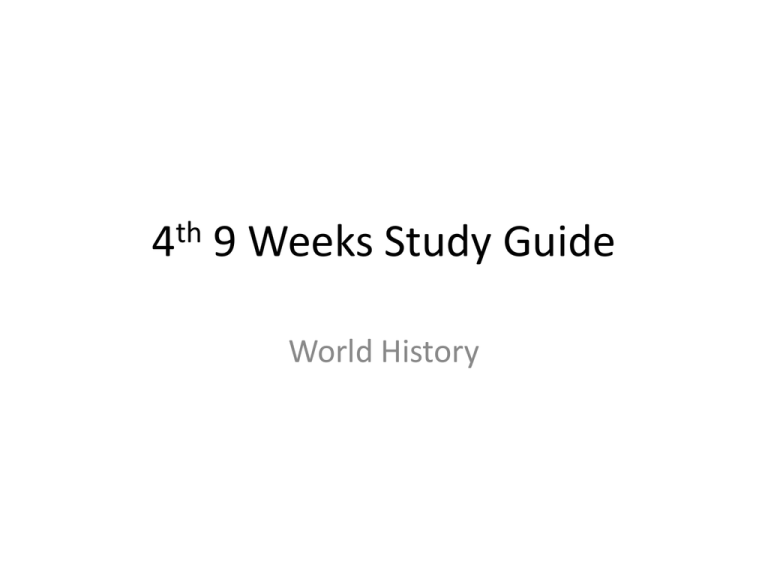
th 4 9 Weeks Study Guide World History Chapter 17 • War communism-Government has complete control over all aspects of the government • Depression-Period of low economic activity and high unemployment • 5 year plan-Stalin’s plan to industrialize Russia and bring it out of the depression • Collectivization-process by which the gov. controls all farms • Totalitarian state-one party with one ruler, in which the gov. controls all aspects of people’s lives Chapter 17 1. 2. 3. 4. 5. 6. 7. 8. 9. US didn’t join, couldn’t maintain the peace after WWI Charles Dawes Stock market crash of 1929 Gov. program to help boost the ecomony, FDR gave jobs to unemployed to help build public works Mussolini Mussolini Trotsky and Stalin, Trotsky Stalin Economic depression in Germany Chapter 17 10. Jews, Mein Kempf, Aryan, 1933 11. It allowed Hitler to establish a totalitarian state by which the government could ignore the constitution for 4 years 12. Hitler’s secret police/army, Heinrich Himmler 13. S.S. 14. They excluded Jews from German citizenship and prohibited Germans from marrying Jews Chapter 18 • Zaibatsu-developed into vast companies that controlled major segments of Japanese industry. • Institutional Revolutionary Party-controlled the major groups within Mexican society and had enormous control over the Mexican presidency. • Oligarchy-government in which a select few exercise complete control Chapter 18 1. 2. 3. 4. 5. 6. He used civil disobedience and nonviolent protests Mao Zedong It rejected U.S. military in Latin America PEMEX Reza Shah Pahlavi Midlevel Japanese extremist army officers who did not have gov. approval 7. Chiang Kai Shek 8. Tried to promote traditional Confucian ideas while rejecting Western capitalism 9. Radical party leader who was elected President of Argentina in 1916 Chapter 19 • Appeasement-British policy based on the belief that giving in to reasonable demands would maintain peace in Europe. • Einsatzgruppen-Special task force responsible for rounding up and killing Jews • Final Solution-Nazi plan to exterminate the Jews • Depression-Period of low economic activity and high unemployment • 5 year plan-Stalin’s plan to industrialize Russia and bring it out of the depression • Totalitarian state-one party with one ruler, in which the gov. controls all aspects of people’s lives • Politburo-Policy making body in Russia Chapter 19 1. It allowed Hitler to establish a totalitarian state by which the government could ignore the constitution for 4 years 2. They excluded Jews from German citizenship and prohibited Germans from marrying Jews 3. Night of the Broken glass…it destroyed Jewish businesses 4. Propaganda minister for Nazi Germany 5. Glorifies the state over the individual and emphasizes the need for a strong dictator 6. Sudetenland, yes 7. Germany invaded Poland 8. Reinhard Heydrich Chapter 19 1. They began to build extermination camps (Final Solution) 2. Japan launched a surprise attack on the U.S. fleet at Pearl Harbor 3. The Battle of Midway 4. U.S., Great Britain, Russia 5. Agreed to partition postwar Germany 6. U.S., Great Britain, Russia 7. Agreed to establish the United Nations 8. Freely elected gov. throughout Europe Chapter 20 • Marshall Plan-designed to restore the economic stability of European nations after WWII • Truman Doctrine-stated that the U.S. would provide money to prevent spread of communism • Warsaw pact-sought to create a military alliance between the U.S and Russia and various other European countries Chapter 20 1. Contributed to the tensions between the Soviet Union and Great Britain 2. U.S. attempt to overthrow the Cuban dictator 3. Joseph McCarthy 4. 4 students were killed by National Guard during anti war demonstrations 5. 1952 6. UK, US, Belgium, Denmark, France, Iceland, Italy, Luxemburg, Netherlands, Norway, Portugal, Canada 7. USSR, Albania, Bulgaria, Czechoslovakia, East Germany, Hungary, Poland, Romania
